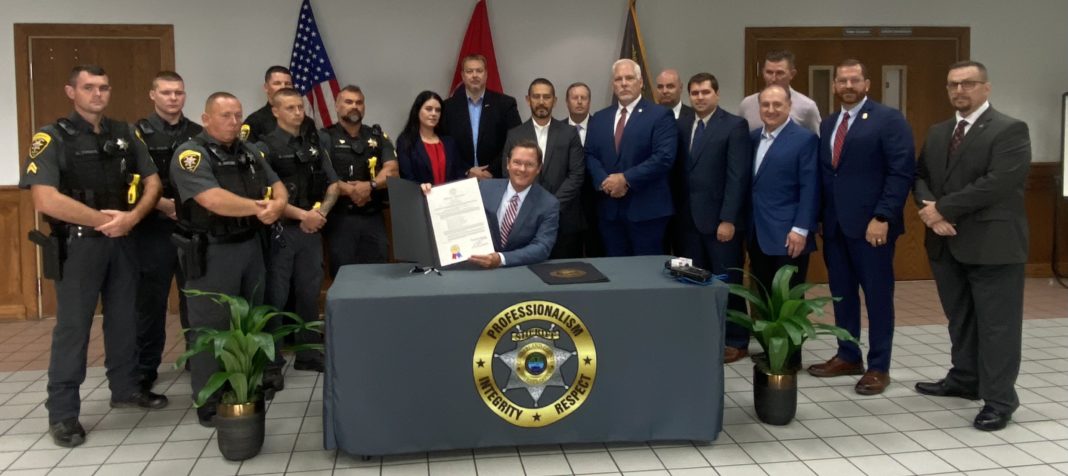
By Michelle Price
Special to the UCBJ
CROSSVILLE – A ceremonial signing was held on Monday, June 27 at the Cumberland County Sheriff’s Office for the Truth in Sentencing Bill championed by Tennessee House Speaker Cameron Sexton. Sexton was joined by District attorney Bryant Dunaway and law enforcement members from Cumberland and Putnam counties.
The bipartisan Truth in Sentencing Bill honors victims of violent crime and their families by making some of the most violent offenses committed mandatory 100% sentences.
These crimes include attempted first-degree murder, second-degree murder, vehicular homicide resulting from intoxication, aggravated vehicular homicide, especially aggravated kidnapping, especially aggravated robbery, carjacking and especially aggravated burglary.
“July 1 is a new day in Tennessee,” said Sexton. “On July 1, Tennessee will be tougher than the federal sentencing guidelines, and we will have the toughest sentencing guidelines for violent criminals in the entire country.”
Sexton emphasized that this bill is about the victims and protecting victims. There are a lot of crimes that are committed by people that have gotten out of jail, not due to the fault of anyone involved in the judicial system, but because of the sentencing code in our state was soft on crime.
“In our state, we’ve drawn a line between what is a violent crime and what’s a non-violent crime,” stated Sexton. “We want to rehab those and help those non-violent offenders to not become violent offenders. But I think everybody agrees that once you cross a certain line into violent offender, that punishment should be different than a non-violent offender.
“Most violent crime doesn’t start as violent crime, they start as misdemeanors, drug offenses; they start as lower case violent crimes,” Sexton added. “Here in the Upper Cumberland, there is a lot of drunk driving intoxication cases where they’ve killed somebody.”
Dunaway explained that some of the hardest conversations he has are with families that have had a family member killed in a fatal car crash by an impaired driver.
“I’ve sat across the table and spoken to wives and explained to them that their husband has been killed by an impaired driver, and under current law, the parole hearing will likely come within 13-14 months when they received a 10-year sentence. That’s totally uncomprehendable to a victim and unfair,” explained Dunaway.
“The unsureness of the current law is changed as of July 1,” Dunaway continued. “Now I can look them in the eye and tell them when and how much time their offender will serve. That is some comfort to victims.”
State Representative Ryan Williams shared a recent example of how the law will benefit the community.
“If this bill would have been in place two months ago, it would have saved the life of an unborn child in my community,” Williams said. “Someone was out on bail on their third DUI, was impaired again driving, hit a car and took the life of an unborn child.”
The main goal of the bill is to protect the public from violent criminals who commit new violent crimes after being released early from their previous sentence.
“You don’t have to look any further than the Christian Newsom murders,” Sexton said. “Because two of those individuals, if we had truth in sentencing, they would have still been in jail and those two kids would still be alive today.
There are crimes out there all over the place,” he continued. “Victims all over the place who would have never been victims if we had had this bill.”
The Truth in Sentencing bill has a provision that will enable lower-level violent criminals to earn programing credits through drug and mental health treatment, education, job training that may reduce their sentence from 100 to 85 percent for certain crimes.








